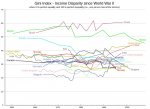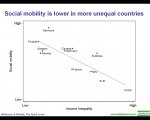OK, not counting OPEC, the following countries rank above the US is per capita income, in order:
Liechtenstein, Macau, Bermuda, Monaco, Luxembourg, Singapore, Jersey, Norway, Falkland Islands, and Switzerland.
It is odd but most of those are Constitutional Monarchies. Don't think that is the way to go but maybe if it works.
Most of those countries are fiscal conservative, with rather good surpluses or small deficits. Macau has a 23.3% of GDP surplus and Norway has a 25.8%. Most are much better than the US which has a 4% deficit.
6 have a higher tax rate than the US. Bermuda, Monaco, Singapore, and Jersey all are close to the US rate.
Don't know what that means. And sometimes the policies that took a nation to the top are not the same as the policies that a country may currently be following and perhaps are not sustainable.
What do you think the main factors are?
First off, I want to thank you for approaching the question with seriousness, and not giving a snarky response. The nature of your reply says a lot about you, all to the good.
As to what you said, the nations you listed are either city-states or very small nations - they aren't really sizable except for Switzerland and Norway. If you'll check, the economic heart of any nation is in its major cities - yes, there is revenue from agriculture, mining, and so forth in rural areas, but this almost never comes close to the revenue generated in urban regions with their factories, mercantile, and finance sectors. For instance, if Kansas goes broke, no big deal...but if NYC goes broke, our economy is suddenly in big trouble.
The much smaller nations and especially the city-states don't have to worry about building and maintaining (at taxpayer expense) infrastructure such as roads, electricity et al, all over vast rural distances, and I believe you'll find that - again, with the exception of Norway and perhaps Switzerland - spend a sizable chunk of their tax revenue on national defense. They are able to use their tax revenue much more effectively to support their urban infrastructure instead. And btw, while Bermuda isn't urban, it is very, very friendly to the rich, and this skews the per capita income just as the oil wealth of OPEC nations does.
In other words, in such a study, city-states and much smaller nations are statistical outliers, just as are the OPEC nations whose vast oil-wealth would also skew such a study. The key, then, would be to compare apples to apples, to compare sizable nations with large rural expanses with other such nations.
My point is, if the hallmark of the success of an economy is the standard of living of its citizens, then we should be looking at what governmental and economic systems work best for nations that are like America: sizable, with significant rural areas, and with significant military power (which knocks Costa Rica out of the study, since they have no taxpayer-supported military). What we find is that the first-world democracies generally have the highest standard of living...and every single one of those first-world democracies have the big government, high effective taxes, and strong regulation that conservatives decry.
To the mind of modern conservatives in America, this makes no sense...but one must ask, then, that why it is, of all the nations in the world (save OPEC states, city-states and very, very small nations), ALL the nations with the highest standard of living are first-world
socialized democracies, all of whom have the big government, high effective taxes, and strong regulation that - according to the conservatives - are a sure-fire path to the economic dustbin of history?


